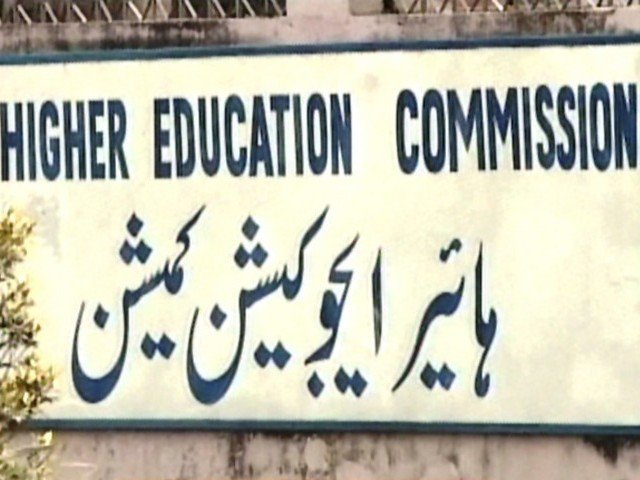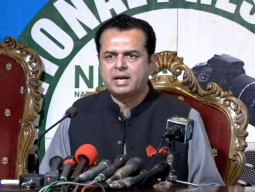
Due to lack of this highly valuable mechanism, the HEC has no other option but to ban the practice of attesting and verifying degrees issued by those varsities, which it fears issue fake or dubious ones. It claims that investigations are under way to nab the officials found involved in such practice.
The HEC’s Attestation and Accreditation (A&A) Division is tasked with accrediting higher education institutes, attesting and equating degrees, issuing no objection certificates and approving charter for varsities. But it uses manual means to check the credibility of a degree as there is no online database available to countercheck it with the relevant varsities.
Heads of varsities discuss ways to end intolerance, radicalisation in higher education
Even though the HEC officials have knowledge about several institutions in Islamabad, Lahore, Karachi and Azad Jammu and Kashmir issuing back-dated degrees after striking underhand deals, they claim that they are helpless in taking action against such varsities as there is no mechanism in place to verify such a fraud.
The process of checking degrees is also deplorable as when all seem to fail to verify a doubtful degree, a Matric pass staffer, considered an expert, is handed over the task.
“The top management has raided A&A Division every now and then,” said an official of the division. “The management knows who are involved, but never lays a hand on them.”
In the August of 2015, the HEC initiated an inquiry against the then A&A director general Farmanullah Anjum to find out who attested a few degrees of Newports Institute of Communications and Economics, Karachi. Since then nothing concrete has been found even after two inquiries as they have yet to fix responsibility.
VCs appointment case: CCI’s role in education standards draws mixed reaction
Furthermore, in 2016, the HEC was informed about the alleged fake degrees of Alkhair University being attested by the commission. The transcripts of the degrees, available with The Express Tribune, reveal that two or three students had just one registration number, which is against the rules and regulations of the HEC.
The issue was brought to the notice of the higher-ups and the A&A Division, but the only solution they could come up with was banning attestation and verification of degrees of the university.
Ebrahim Khan, a student, is suffering due to the ban.
“I told the HEC officials about the students who got their dubious documents and degrees attested, but instead of taking action against them, the management started harassing me for raising the issue,” he said.
In February, Alkhair submitted 78,000 degrees with the HEC to get the record verified and counterchecked.
Higher education : PHEC launches split PhD programme for teachers
The HEC has been issuing parent alerts in national dailies that “serious irregularities and mismanagement in academic operations” are rampant in Global Institute Lahore, Alkhair, and others. The HEC has stopped attestation of degrees of those varsities.
This development begs to question the validity of the degrees attested in the past.
An official of the Alkhair University has denied wrongdoing. “These are just allegations and nothing more than that,” he said on condition of anonymity.
The challenge can be gauged by the fact that the so-called measures taken during the last few years to stem out the illegal practice are not bearing the desired results. The reshuffling of just the lower staff speaks volumes about insensitivity of the higher-ups to take the threat seriously.
To stop the public from seeking attestation and verification of fake degrees, the HEC last year announced that such documents would be confiscated and their cases would be forwarded to the Federal Investigation Agency (FIA). To date not a single case has been forwarded to the FIA, although dozens of degrees have been confiscated.
CADD, HEC to probe SZABMU’s private account
The HEC had told the media in October 2015 that to stop issuance and verification of such dubious degrees, a software programme was being developed in collaboration with the National Database and Registration Authority (Nadra), but to date no progress has been made.
When contacted, media section of the HEC had no clear answer to the queries about the prevailing scenarios and steps taken to end the malpractice.
About the inquiries, the HEC officials stated that the initial fact finding committee has “circumstantial evidence that proves mishandling of the matter and the process of fixing responsibility is under process as per the government rules while second inquiry report has also been completed and soon action will be taken against the perpetrators.”
They said recently the HEC had issued a directive to all the universities that their degrees and transcripts must be printed by Pakistan Security Printing Corporation.
They denied the impression that unfair practices are rampant. “Our system is well in place and there are a number of parameters that are used to verify documents,” they said, adding that the Nadra-embedded system will be implemented soon.









1732355030-0/BeFunk_§_]__-(41)1732355030-0.jpg)







COMMENTS (2)
Comments are moderated and generally will be posted if they are on-topic and not abusive.
For more information, please see our Comments FAQ